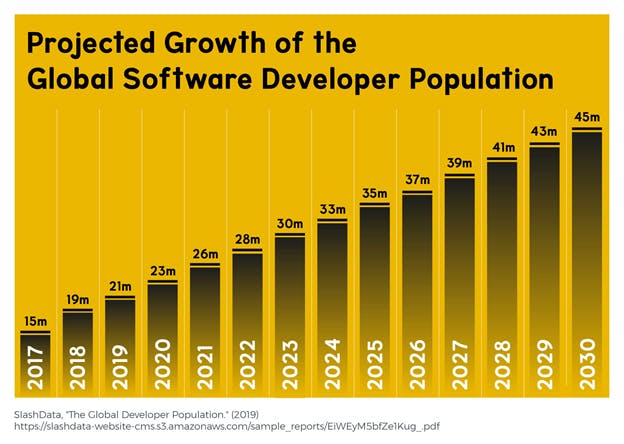I put together some of the questions most aspiring developers will love to get answers to. These questions are precisely answered from the information I got from senior developers and communities. Some links are added for a more elaborate explanation of some questions. I hope you find this piece helpful.
Why software development?
According to IBM Research:
“Software development refers to a set of computer science activities dedicated to the process of creating, designing, deploying and supporting software.”
This software is needed to tell a computer system what to do. With great innovations in the technology industry, there are great interactions between humans and the digital world thereby creating a wide opportunity for software developers to explore. In 2018, the reports from SlashData indicate that by 2030 there will be 45m, active software developers, globally.

Software development provides solutions to a lot of problems through mind-blowing projects. It creates the environment for different communities of talented individuals to work together from different parts of the world. Software development also provides lots of high-paying career paths worth investing one’s entire life in.
What career paths are available for aspiring developers?
There are a lot of opportunities as a software developer in various career paths. The following are available career paths as listed in an interesting article by geeksforgeeks:
- Front-end Developers
- Back-end Developers
- Mobile Engineers
- Game Developer
- Application Developers
- Tools and Enterprise Software Developers
- Data Scientist
- QA/Test/Automation
- Algorithms/Science Software Development
- Embedded System Developers
- Linux Kernel and OS Developers
- DevOps Engineer
- Full Stack Developers
- Language/Compiler Developers
- Cloud Developers
A field can not be said to be better than the other nor can certainly be said to be more rewarding and highly paid than the other. As the tech world grows rapidly, each field contains a whole lot of experience, relevant knowledge, and challenges to explore.
How do you do choose your path and stay on track?
![giphy[1].gif](https://cdn.hashnode.com/res/hashnode/image/upload/v1632824183898/7zX7T61iH.gif?auto=format,compress&gif-q=60&format=webm)
You can determine this by thinking of a particular problem you would love to solve as a developer. This problem(s) may affect you directly or may affect your loved ones or those around you. Research on the career paths that handles best that particular problem and make a go for it once you find it. This is a good approach to choose a path.
software development is an amazing field where people love to share, getting resources to learn is not so difficult once you have chosen the path to follow.
You can also picture yourself in a role you would like to play in a particular company of your choice. Check the requirements most companies use to employ people to fill that particular role and try to work towards it.
A Degree, Bootcamp, or self-taught?
![giphy[3].gif](https://cdn.hashnode.com/res/hashnode/image/upload/v1632822751961/lMPoYgL0q.gif?auto=format,compress&gif-q=60&format=webm)
Getting a degree is a plus, especially in terms of searching for jobs and opportunities. But to become creative and good, you do not need a degree. You can become a self-taught developer working in the best companies in the world. It just needs extra effort and some level of accountability.
Bootcamps are influential, especially for starters, it quickly exposes a newbie to what is needed in the industry. It also creates the chance to have one-on-one mentorship. However, getting the right Bootcamp to attend is important. Donthedeveloper has a nice youtube channel that makes reviews on Bootcamps and discusses a lot of things about being a self-taught developer.
How do I join a good community?
A good community will help fast track your learning process as well as, make the process less frustrating, and more entertaining. Communities like StackOverflow, Hashnode, and others are influential for developers around the world. Bolaji Ayodeji compiles a list of 20 awesome communities you can join as a developer. You certainly don’t need to join every single one. You can just pick the one that works best for you.
Finally!
![giphy[1].gif](https://cdn.hashnode.com/res/hashnode/image/upload/v1632825028761/a9JCMzAZe.gif?auto=format,compress&gif-q=60&format=webm)
Eric Schmidt, CEO of Google, said,
“We run this company on questions, not answers.”
The best way to be creative as a developer is to ask questions. It makes ideas clearer and it also helps find better answers to problems.
